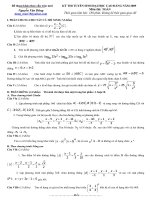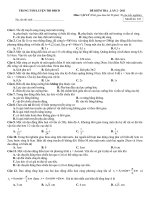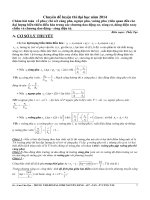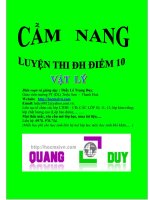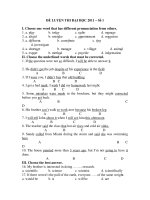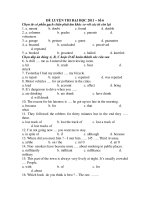ĐỀ LUYỆN THI ĐẠI HỌC 2011 (ĐỀ SỐ 7) pps
Bạn đang xem bản rút gọn của tài liệu. Xem và tải ngay bản đầy đủ của tài liệu tại đây (150.09 KB, 5 trang )
TRUNG TÂM LUYỆN THI ĐẠI HỌC CHẤT LƯỢNG CAO QSC-45
ĐỀ LUYỆN THI ĐẠI HỌC 2011
(ĐỀ SỐ 7)
Thời gian làm bài: 90 phút
ĐỀ THI GỒM CÓ 90 CÂU
I. Mark A, B ,C or D to indicate the word that is pronounced differently from the rest.
1. A. often B. listen C. after D. castle
2. A. great B. heat C. beat D. creature
3. A. knew B. sew C. few D. view
4. A. brother B. smooth C. without D. tooth
5. A. plays B. says C. lays D. days
II. Mark A, B, C or D to indicate the word whose main stress differs from the rest.
6. A. purpose B. product C. propose D. progress
7. A. access B. manage C. problem D. unique
8. A. necessary B. dormitory C. convenient D. demonstrate
9. A. familiar B. automatic C. responsible D. environment
10. A. industry B. embarrass C. develop D. essential
III. Mark A, B, C or D to indicate the correct answer to the following questions.
11. The thief was caught by the police and was trembling _______ fear.
A. at B. by C. with D. in
12. The pain was intolerable during the night, so I had to _________ a doctor.
A. call for B. send for C. invite to D. ask for
13. She passed the university entrance examination, ______ made her parents proud.
A. it B. that C. which D. what
14. I will never forget ___________ and proud when I graduated from college.
A. be happy B. to be happy C. being happy D. having happy
15. He has put his car entirely at our __________ for the holiday.
A. usage B. pleasure C. run D. disposal
16. If he had listened to my advice, he ___________ in trouble now.
A. won’t be B. wouldn’t be C. weren’t D. wouldn’t have been
17. He took a drink from his glass of water and then _________ his speech.
A. returned B. refreshed C. restored D. resumed
18. _______ everyone working here, I would like to thank you for your generous donation.
A. On the whole B. On behalf of C. With regard to D. In view of
19. I cannot stay up late at night. I prefer ___________ early.
A. turning on B. turning up C. turning in D. turning out
20. ______ second thoughts, I decided not to go on holiday in Paris.
A. In B. On C. With D. By
21. I haven’t seen Peter for a long time. I will _________ him this weekend.
A. call for B. call in C. call off D. call on
22. __________ you find yourself in difficulty, please ask for help.
A. Could B. May C. Should D. Must
23. The escaped prisoner is still _____________.
A. at hand B. at will C. at large D. at last
24. Farmers are at the _______ of the bad weather that can destroy their crop.
A. change B. influence C. force D. mercy
25. She took a _________ of absence from work when she had her baby.
A. permit B. record C. leave D. file
26. The company has just got a big order and the workers are working around the_________.
A. night B. day C. hour D. clock
27. The pain was intolerable during the night, so I had to _________ a doctor.
A. call for B. send for C. invite to D. ask for
28. The ground is wet. It _______________ rained last night.
A. must B. must have C. may have D. might have
29. ___________ members of my family has a share in doing household chores.
A. Each of the B. Every C. All D. None of
30. I don’t like John. His _________ complaints make me angry.
A. continual B. continuous C. constant D. permanent
IV. Read the passage and choose the correct answer to each of the questions from 31 to 40.
For centuries, sky watchers have reported seeing mysterious flashes of light on the surface of the Moon.
Modern astronomers have observed the same phenomenon, but no one has been able to satisfactorily explain
how or why the Moon sporadically sparks. However, researchers now believe that they have found the cause.
Researchers have examined the chemical content of Moon rocks retrieved by astronauts during the
Apollo missions and have found that they contain volatile gases such as helium, hydrogen and argon. The
researchers suggest that stray electrons, freed when the rock cracks, they ignite these gases. Indeed, lunar rock
samples, when fractured in the lab, throw off sparks.
What causes these rocks to crack on the lunar surface ? The flashes are most often seen at the borders
between sunlight on the Moon, where the surface is being either intensely heated or cooled. A sudden change
in temperature may cause thermal cracking. Another possibility is that meteors may strike the rocks and cause
them to crack. Finally, lunar rocks may be fractured by seismic events, in other words, by tiny moonquakes.
31. How long have people been aware of the mysterious light of the Moon ?
A. For the last ten years. B. Since the Apollo missions.
C. For hundreds of years. D. For thousands of years.
32. The word “sporadically” in line 3 is closest in meaning to which of the following?
A. reputedly B. occasionally C. mysteriously D. constantly
33. The word “no one” refers to
A. people B. watchers C. astronomers D. researchers
34. The theory that Moon rocks give off sparks when they crack is supported by
A. a telescope study of the Moon. B. experiments conducted by astronauts.
C. observations made centuries ago. D. an analysis of rocks from the Moon.
35. How many possibilities explaining the reason why Moon rocks crack ?
A. one B. two C. three D. four
36. Which of the following gases is NOT found in chemical content of the Moon rock ?
A. helium B. hydrogen C. oxygen D. argon
37. The word “they” in line 6 refers to
A. helium, hydrogen and argon. B. researchers.
C. Apollo spacecraft. D. lunar rocks.
38. According to the researchers, the main factors that cause Moon rocks to spark are
A. the sudden changes in temperature.
B. stray electrons in volatile gases freed when the rock cracks.
C. tiny quakes on the moon.
D. meteors which strike the rocks and cause them to crack.
39. The passage mainly discusses
A. chemical content of Moon rock.
B. missions of Apollo on the Moon.
C. the mysterious flashes of light on the surface of the Moon.
D. the sudden change in temperature on the Moon.
40. Which of the following statements describe the organization of the passage ?
A. The significance of an experiment is explained.
B. A generalization is made, and examples of it are given.
C. A popular notion is refuted.
D. A phenomenon is described, and a possible explanation is proposed.
V. Read the following passage and mark the letter A, B, C, or D to indicate the correct each of the blanks
from 41 to 50.
Along (41) ___jogging and swimming, cycling is one of the best all-round forms of exercise. It can help to
increase your strength and energy, giving you more (42)____ muscles and stronger heart. But increasing your
strength is not the only advantage of cycling. Because you are not (43)______the weight of your body on your
feet. It is a good form of exercise for people with painful feet or backs. However, with all forms of exercise, it
is important to (44)___slowly and build up gently. Doing too much too quickly can damage muscles that are
not (45) ____ to working. If you have any doubts about taking (46) ____cycling for health reasons, talk to
your doctor and ask his or her advice.
Ideally you should be cycling at (47) _____ two or three times a week. For the exercise to be doing you
(48) __, you should get a little out of breath. Don’t worry that if you begin to lose your breath, it could be
dangerous and there must be something wrong with your heart. This is simply not true, shortness of breath
(49) _____that the exercise is having the right effect. However, if you find you are in pain, (50) ___ you
should stop and take a rest.
41. A. on B. at C. by D. with
42. A. confident B. efficient C. better D. reliable
43. A. bringing B. carrying C. lifting D. arising
44. A. make B. take C. start D. do
45. A. have B. ought C. used D. made
46. A. in B. up C. out D. on
47. A. best B. all C. least D. times
48. A. good B. well C. nice D. fine
49. A. tells B. shows C. points D. appears
50. A. then B. though C. even D. yet
VI. Mark the letter A, B, C, or D to indicate the underlined part that needs correction.
51. In order that a student to be successful in the exam, he / she must study very hard.
A B C D
52. It was her who suggested that I go to HCM city to get a direct flight.
A B C D
53. The surgeon examined the patient quickly, and then the operation began.
A B C D
54. The color of a star depends on the heat and how much energy it produces.
A B C D
55. Peter told me not to be worried and promised to help me if I have difficulty to find a job.
A B C D
VII. Mark the letter A, B, C or D to complete each of the following questions.
56. Never _______________ interested in soccer as before.
A. have been many Americans B. have many Americans been
C. Americans have been many D. many Americans have been
57. _______________, he was determined to continue to climb up the mountain.
A. As he might feel tired B. He felt very tired though
C. Tired as it was D. Tired as he might feel
58. Many plants can grow in water, __________ nutrients are added.
A. as long as B. besides
C. above all D. however
59. _____ gold, silver, copper and platinum, nuggets of pure iron are rarely found in nature.
A. As unlike B. Unlike the
C. Unlike D. Unlikely
60. There is no water on the moon, nor ____________ an atmosphere around it.
A. there is B. there is not
C. is there D. is it
VIII. Read the passage and mark the letter A, B, C or D to indicate the correct answer to each of
the questions from 61 to 70.
Today cars are smaller, safer, cleaner, and more economical than their predecessors, but the cars of the
future will be far more pollution-free than those on the road today. Several new types of automobile engines
have already been developed that run on alternative sources of power such as electricity, compressed natural
gas, methanol, steam, hydrogen, and propane. Electricity, however, is the only zero-emission option presently
available.
Although electric vehicles will not be truly practical until a powerful, compact battery or other dependable
source of current is available, transportation experts foresee a new assortment of electric vehicles entering
everyday life : shorter-range commuter electric cars, three-wheeled neighborhood cars, electric delivery vans,
bikes, and trolleys.
As automakers work to develop practical electric vehicles, urban planners and utility engineers are
focusing on infrastructure systems to support and make the best use of the new cars. Public charging facilities
will need to be as common as today’s gas stations. Public parking spots on the street or in commercial lots will
need to be equipped with devices that allow drivers to charge when they shop, dine, or attend a concert. To
encourage the use of electric vehicles, the most convenient parking in transportation centers might be reserved
for electric cars.
Planners foresee electric shuttle buses, trains, buses, and neighborhood vehicles all meeting transit centers
that would have facilities for charging and renting. Commuters will be able to rent a variety of electric cars to
suit their needs : light trucks, three-wheelers, small cars, or electric / gasoline hybrid cars for longer trips,
which will no doubt take place on automated freeway able to handle five times the number of vehicles that can
be carried by a freeway today.
61. The author’s purpose in the passage is to
A. criticize conventional vehicles.
B. support the invention of electric car.
C. narrate a story about alternative energy vehicles.
D. describe the possibilities for transportation in the future.
62. The word “predecessors” means
A. those who invent something. B. those who discover something.
C. those who work before others. D. those who make cars.
63. The passage would most likely be followed by details about
A. automated freeways. B. pollution restrictions in the future.
C. the neighborhood of the future. D. electric shuttle buses.
64. The following electric vehicles are all mentioned in the passage EXCEPT
A. vans. B. trains. C. planes. D. trolleys.
65. In the second paragraph, the author implies that
A. a dependable source of electric energy will eventually be developed.
B. everyday life will stay much the same in the future.
C. a single electric vehicle will eventually replace several modes of transportation.
D. electric vehicles are not practical for the future.
66. According to the passage, public parking lots of the future will be
A. more convenient than they are today. B. equipped with charging devices.
C. much larger than they are today. D. as common as today’s gas stations.
67. The passage would most likely be found in a
A. medical journal. B. history book.
C. popular psychology periodical. D. textbook on urban planning.
68. The word “charging” in line 12 refers to
A. electricity B. gas station C. device D. trolley
69. The word “foresee” in line 16 could best be replaced with
A. anticipate B. consider C. meditate D. preoccupy
70. The cars of the future will run on all of the following EXCEPT
A. propane B. methanol C. gasoline D. hydrogen
IX. Mark the letter A, B, C, or D to indicate the sentence that is closest in meaning to each of
the following questions.
71 I came home late because of the heavy traffic.
A. Provided the traffic had been heavy, I wouldn’t come home late.
B. It was such a heavy traffic that I came home late.
C. The traffic was heavy, so I didn’t come home late.
D. If it hadn’t been for the heavy traffic, I would have come earlier.
72. I won’t sell the painting, no matter how much you offer me.
A. Whenever you offer me to buy the painting, I won’t sell it.
B. How many money you offer me, I won’t sell the painting.
C. Whatever price you offer me, I won’t sell the painting.
D. In spite of your offering me how much money, but I won’t sell the painting.
73. Although he was very tired, he agreed to play tennis with me.
A. Tired as he was, he agreed to play tennis with me.
B. He was tired enough to played tennis with me.
C. He agreed to play tennis with me, but he was too tired.
D. His tiredness was so great that he agreed to play tennis with me.
74. It wouldn’t be a waste of time to look at that house again.
A. You shouldn’t waste your time to look at that house again.
B. Did you find that look at that house again was a waste of time ?
C. It was worth looking at that house again.
D. Would we consider to look at that house again ?
75. She worked very hard, but she didn’t pass the exam.
A. Although her work was hard, she didn’t pass the exam.
B. How hard she did the work, she didn’t pass the exam.
C. However hard she worked, she didn’t pass the exam
D. No matter what hard work she did, she didn’t pass the exam.
76. I write to her almost every day.
A. Not a day goes by unless my writing to her.
B. Hardly does a day go by without my writing to her.
C. No day goes by without my writing to her.
D. Not day goes by without my writing for her.
77. I am sure he badly needed the money.
A. He badly needed the money was sure to me.
B. He is sure badly needed the money.
C. He must have badly been in need of the money.
D. He could have badly needed the money.
78. The noise next door didn’t stop until midnight.
A. It was not until midnight that the noise next door stopped.
B. Not until midnight did the noise next door stopped.
C. Only when midnight did the noise next door stopped.
D. Hardly had the noise next door stopped than it was midnight.
79. He can shout even louder, but I won’t take any notice.
A. However loud he can shout, but I won’t take any notice.
B. No matter how loud he can shout, I won’t take any notice.
C. He can shout even louder won’t take any of my notice.
D. Whatever ability he shout won’t take notice of me.
80. Everyone expected her to win the tournament, but she didn’t.
A. Unlike everyone expected, she didn’t win the tournament
B. Everyone was unexpected when she won the tournament.
C. Contrary to everyone’s expectation, she lost the tournament.
D. To everyone’s expectation, she won the tournament.
